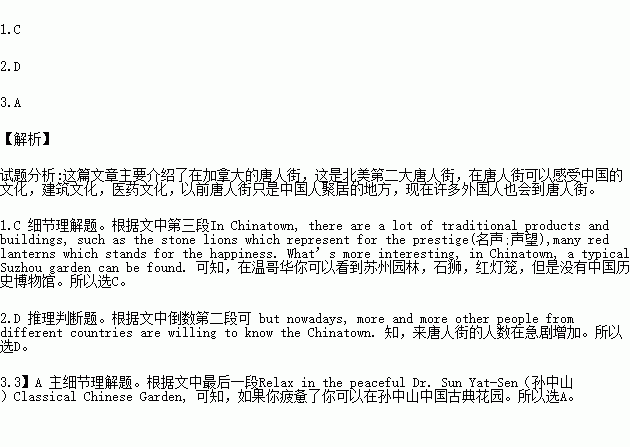题目内容
Vancouver’s Chinatown—Canada’s largest Chinatown
Vancouver’s Chinatown is North America’s second biggest Chinatown, after San Francisco’s. Mandarin(普通话)and Cantonese are the mother tongues in 30% of Vancouver homes, which makes Chinese the largest “minority” ethnic group(少数民族).
Vancouver’s Chinatown is the place to visit for a taste of Chinese culture.
In Chinatown, there are a lot of traditional products and buildings, such as the stone lions which represent for the prestige(名声;声望),many red lanterns which stands for the happiness. What’s more interesting, in Chinatown, a typical Suzhou garden can be found. Chinatown not only expresses the culture of China to the other cultures, but also one part shows that Vancouver is the multicultural society. Chinatown which carries many Chinese cultures is built by Chinese in Vancouver. In the beginning, Chinatown was the community only for Chinese people, but nowadays, more and more other people from different countries are willing to know the Chinatown. It is the part of the Vancouver’s society, and Chinatown is also changing gradually in order to adjust to Vancouver.
There are lots of interesting markets with many varieties of fresh and dried seafood and mushrooms in the Chinatown. You’ll also find cheap and fine house ware and traditional Chinese medicine. During the summer, on weekend evenings, Keefer and Pender Streets become a busy open-air night market. If you have enough time for a meal, try at one of the many small restaurants. It is not an expensive, multi-course culinary(烹调的)adventure. Relax in the peaceful Dr. Sun Yat-Sen(孙中山)Classical Chinese Garden, or just steps on Pender Street. Visit the Chinese Cultural Centre Museum, or participate in one of its many activities.
1.In Vancouver’s Chinatown you can see all the things EXCEPT .
A. a typical Suzhou garden
B. the stone lions
C. the Chinese History Museum
D. red lanterns
2.From the third paragraph, we can infer that .
A. Canadians helped to build Vancouver’s Chinatown
B. only the Chinese people live in Vancouver’s Chinatown
C. in Vancouver’s Chinatown you can appreciate the culture of Vancouver
D. an increasing number of people come to Vancouver’s Chinatown
3.If you are tired you should have a rest in .
A. Dr. Sun Yat-Sen Classical Chinese Garden
B. the Chinese Cultural Centre Museum
C. an interesting market on the Pender Street
D. one of the many small restaurants


 ? I’ll give each of them only $ 1 and keep the $ 2 left to myself. The men will be happy to get anything back, and I can also make some money that way. After all, Mr. Black will never know anything about it.” So, the assistant returned only $1 to each of the three men.
? I’ll give each of them only $ 1 and keep the $ 2 left to myself. The men will be happy to get anything back, and I can also make some money that way. After all, Mr. Black will never know anything about it.” So, the assistant returned only $1 to each of the three men. ager did not know how to make money, but the assistant did.
ager did not know how to make money, but the assistant did. in. Have you ever wanted to know why some people like very loud music? They must like to feel the sounds of music.
in. Have you ever wanted to know why some people like very loud music? They must like to feel the sounds of music. , it is n
, it is n
 e some things to touch. Their signs say, “Do touch! There you can feel everything on show. If you want to see better, reach out and touch. Then you’ll really see!”
e some things to touch. Their signs say, “Do touch! There you can feel everything on show. If you want to see better, reach out and touch. Then you’ll really see!”